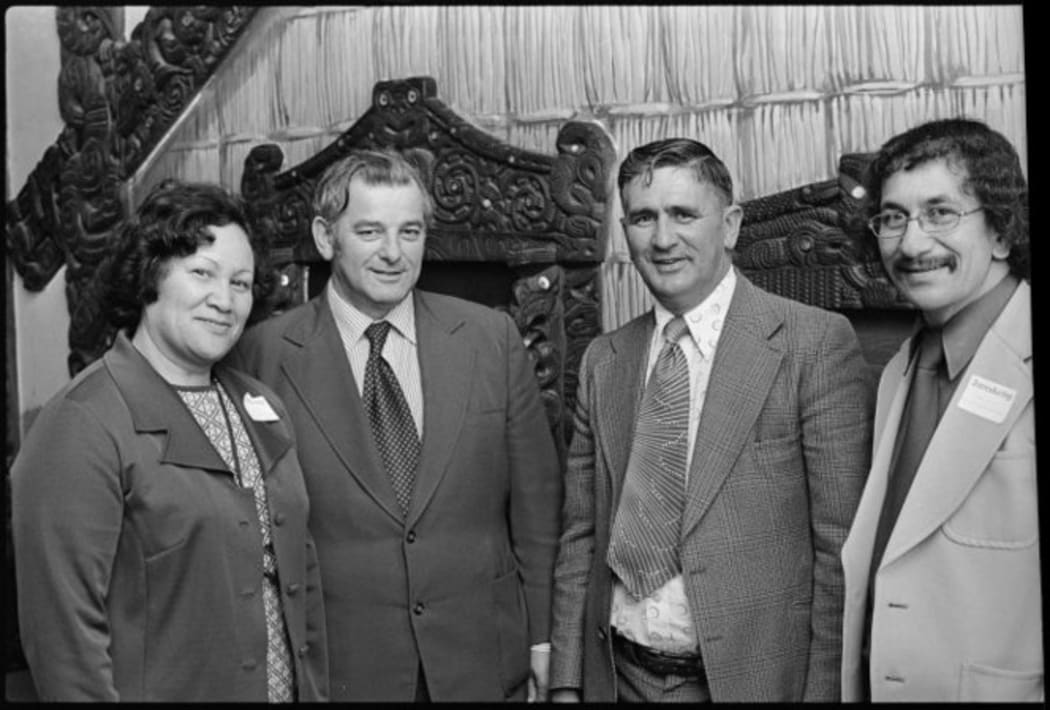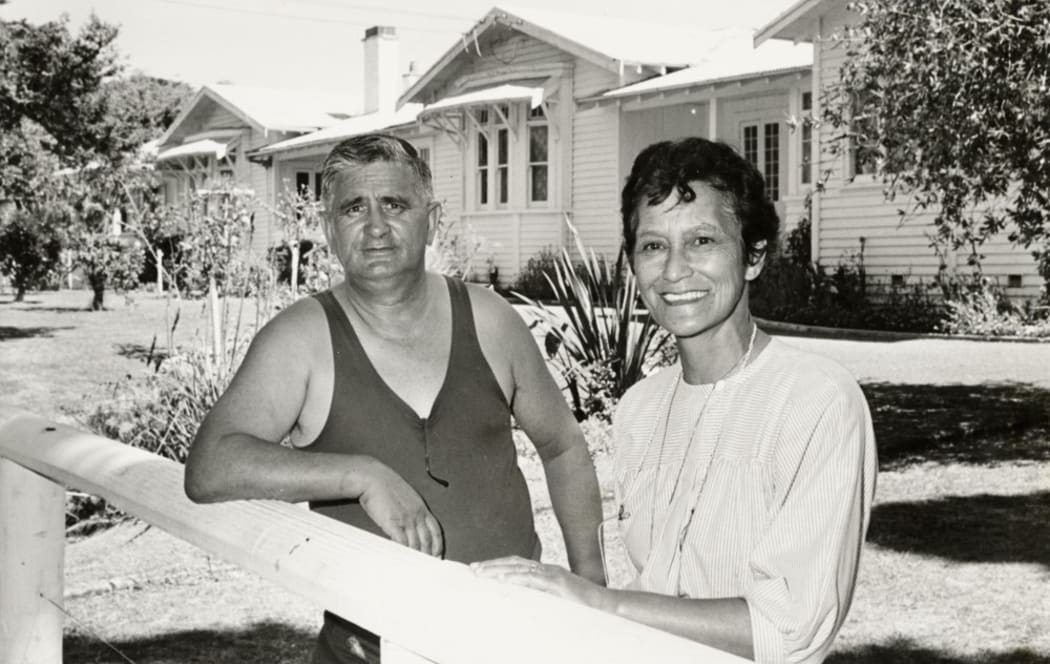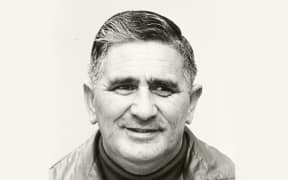Sir Graham Latimer is being remembered as a leader who walked in two worlds - and who was instrumental in resolving grievances, while fighting for the betterment of his people.
The former New Zealand Māori Council president, who died at his home in Kaitaia today, was 90, and had been unwell for some time.
Former Cabinet minister and friend Shane Jones was among those who paid tribute to him today, saying that the North had lost a mighty kauri.

Sir Graham Latimer, second from right, with Wairarapa and Wellington leaders at Parliament in 1977. Photo: Dominion Post Collection / Alexander Turnbull Library
Sir Graham was born in 1926 at Waiharara in the Far North into a family of six children. His father was of Ngāti Kahu and his mother was Pākehā.
He led the court actions against the Crown in the 1980s that were pivotal in securing Māori rights, under the Treaty of Waitangi, to state-owned lands, forests and fisheries.
He believed strongly that Māori needed to become economically independent, but he was criticised by some younger Māori activists for being too conservative.
Hone Harawira was one of those activists, and said he came to realise through his protests and activism that Sir Graham had been able to make gains for Māori in a different way.
"He said 'over the years, I've watched you young men in action and whenever you guys used to get up to trouble it was always something that created a national stir'."
Sir Graham told him that he'd always get a call from the prime minister of the day when they caused trouble, Mr Harawira said.
"He said to me, 'I used to say to the prime minister, I don't agree with what those boys are doing but they make a point and I think if you make these adjustments it might help'."
'You can't back away, you can't step sideways'
Like many others from his era, Sir Graham - while not forgetting his Māori heritage - deliberately followed a Pākehā way of life.
In the 1950s, he found himself immersed in Māori affairs when he was elected iwi spokesperson for Ngāti Whatua and singled out by elders as a potential leader in policy and strategy.
In an interview with RNZ, Sir Graham talked about being chosen as a leader.
"The people were determined I was going to be there. You've got no idea the force that is behind you, you can't back away, you can't step sideways, there's no way you can say 'I'm going to duck out of this'."

Sir Graham and his wife, Lady Emily Latimer Photo: Florence Keene / Whangarei Libraries
As a young man, he had enlisted in the Territorial Army - then in the New Zealand Army when he was old enough. He married Emily Moore, who died last year, and they had five children together.
But it was his work with the New Zealand Māori Council that Mr Jones said Sir Graham would be remembered for.
"Sir Graham Latimer led the charge through a mix of pragmatism, major cunning and powerful leadership in relation to plonking Treaty [of Waitangi] claims right in the middle of the court system and using pragmatism to advance the interests of all New Zealand."
He added: "I doubt we'd be quite the place we are today had it not been for Sir Graham Latimer and his leadership of the New Zealand Māori Council successfully taking on various governments since the 1970s."
Sir Graham was knighted for his services to the Māori people in 1980.
The passing of Sir Graham Latimer has put a dampener on the day. What a contribution to Maoridom.A fighter for Maori right in so many things
— Rino Tirikatene (@RinoTirikatene) June 7, 2016
Prominent Maori leader Sir Graham Latimer dies. Aue taukuri e! Kua hinga te totaranui o te waonui a Tane. Oki atu! https://t.co/1ZsLHXtEsL
— Wira Gardiner (@GardinerWira) June 7, 2016
So sad to hear this. Big loss for NZ. Sincere condolences to the whanau. https://t.co/kqg84UR9jt
— Jodi Ihaka (@JodiIhaka) June 7, 2016
Ka aroha e te matua Tā Graham Latimer...
— Wepiha Te Kanawa (@wepihatekanawa) June 7, 2016
Our thoughts are with the family and friends of New Zealand Maori leader, Sir Graham Latimer, who passed away today, aged 90.
— Australia in NZ (@AusHCNZ) June 7, 2016
One of his biggest challenges came in 1986 when the State-Owned Enterprises Act allowed the sale of Crown land.
If land under Treaty of Waitangi claims was transferred to SOEs and then sold on to private owners, the Waitangi Tribunal would be unable even to make recommendations.
Sir Graham led legal action that ended with the Court of Appeal affirming Māori rights in fishing, forestry and broadcasting.
The court declared unanimously that the principles of the treaty over-rode everything else in the act.
Sir Graham had this to say about the treaty: "Getting the Treaty of Waitangi recognised in legislation and in the legal system of this country is probably the greatest breakthrough that Māoridom has made.
"The courts that followed are hugely important but those courts could never be in place if the ground work hadn't been put in place."
Sir Graham, who was of Ngāti Kahu, Te Aupouri and Te Rarawa descent, is survived by his five children. His body will lie in state at his marae in Pamapuria near Kaitaia.
Kotahi whatukura i makaia ki waho
Ki a Tangaroa-whakamau-tai
Hei rāhui mai i a Hine-moana
Kotahi whatukura i makaia mai
Ki roto o Hawaiiki-rangi
I takoto ai te ara whānui-o-Tāne
Nō reira, e kara, e Tā Kereama, haere.



